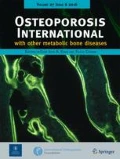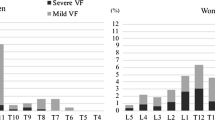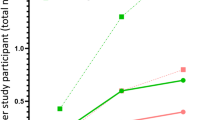Abstract
Summary
This study investigated the prevalence of radiographic vertebral fractures using Genant’s semiquantitative (SQ) scoring system in elderly Chinese men (n = 2,000; mean age, 72.4 years) and women (n = 2,000; mean age, 72.6 years). Vertebral deformities had similar prevalence in elderly men (14.9 %) and women (16.5 %). Majority of the deformities in men were mild (9.9 %, grade = 1). The prevalence of vertebral fractures (grade ≥ 2) was 5.0 % among men and 12.1 % among women.
Introduction
Vertebral fracture is a serious consequence of osteoporosis and is often under-diagnosed. Researches on different ethnicities and territories to estimate the prevalence of vertebral fractures and to identify the risk factors are necessary.
Methods
Mr. OS (Hong Kong) and Ms. OS (Hong Kong) represent the first large-scale cohort studies ever conducted on bone health in elderly Chinese men (n = 2,000) and women (n = 2,000). The current study investigated the prevalence of radiographic vertebral fractures in these subjects using Genant’s SQ scoring system and identified risk factors for vertebral fractures.
Results
The radiographs of all men (mean age, 72.4 years) and women (mean age, 72.6 years) were obtained. Six hundred twenty-seven subjects (15.7 %) had at least one vertebral deformity (SQ grade ≥ 1), including 297 men (14.9 %) and 330 women (16.5 %, p = 0.151). Three hundred forty-two participants (8.6 %) were defined as having at least one vertebra fracture (SQ grade ≥ 2), consisted of 100 men (5.0 %) and 242 women (12.1 %, p < 0.001). Older age, lower bone mineral density, lower physical activity, lower grip strength, fracture history, and low back pain were significantly associated with higher vertebral fracture rate for both men and women.
Conclusion
Vertebral deformity had similar prevalence in older men and women, while vertebral fracture was more common in women. Majority of deformities in men was mild. The vertebral deformity prevalence of women from this study is similar to previous reports of other East Asian women and Latin American women.

Similar content being viewed by others
References
Cummings SR, Melton LJ (2002) Epidemiology and outcomes of osteoporotic fractures. Lancet 359:1761–1767
Delmas PD, van de Langerijt L, Watts NB, Eastell R, Genant H, Grauer A, Cahall DL, IMPACT Study Group (2005) Underdiagnosis of vertebral fractures is a worldwide problem: the IMPACT study. J Bone Miner Res 20(4):557–563
Kanis JA, Johnell O, De Laet C, Johansson H, Oden A, Delmas P, Eisman J, Fujiwara S, Garnero P, Kroger H, McCloskey EV, Mellstrom D, Melton LJ, Pols H, Reeve J, Silman A, Tenenhouse A (2004) A meta-analysis of previous fracture and subsequent fracture risk. Bone 35:375–382
Katowics MA, Melton LJ III, Copper C, Atkinson EJ, O’fallon WM, Riggs BL (1994) Risk of hip fracture in women with vertebral fracture. J Bone Miner Res 9:599–605
Johnell O, Oden A, Caulin F, Kanis JA (2001) Acute and longterm increase in fracture risk after hospitalization for vertebral fracture. Osteoporos Int 12:207–214
Linsay R, Silverman SL, Cooper C, Hanley DA, Barton I, Broy SB, Licata A, Benhamou L, Geusens P, Flowers K, Stracke H, Seeman E (2001) Risk of new vertebral fracture in the year following a fracture. JAMA 285:320–323
Black DM, Arden NK, Palermo L, Pearson J, Cummings SR (1999) Prevalent vertebral deformities predict hip fractures and new vertebral fractures but not wrist fractures. Study of Osteoporotic Fracture Research Group. J Bone Miner Res 14:821–8287
Kung AWC (2004) Epidemiology and diagnostic approaches to vertebral fractures in Asia. J Bone Miner Metab 22:170–175
Johnell O, O’Neill T, Felsenberg D, Kanis J, Cooper C, Silman AJ (1997) Anthropometric measurements and vertebral deformities. European Vertebral Osteoporosis Study (EVOS) Group. Am J Epidemiol 146:287–293
Ling X, Cummings SR, Mingwei Q, Xihe Z, Xioashu C, Nevitt M, Stone K (2000) Vertebral fractures in Beijing, China: the Beijing Osteoporosis Project. J Bone Miner Res 15:2019–2025
Clark P, Cons-Molina F, Deleze M, Ragi S, Haddock L, Zanchetta JR, Jaller JJ, Palermo L, Talavera JO, Messina DO, Morales-Torres J, Salmeron J, Navarrete A, Suarez E, Pérez CM, Cummings SR (2009) The prevalence of radiographic vertebral fractures in Latin American countries: the Latin American Vertebral Osteoporosis Study (LAVOS). Osteoporos Int 20:275–282
Lopes JB, Danilevicius CF, Takayama L, Caparbo VF, Menezes PR, Scazufca M, Kuroishi ME, Pereira RMR (2011) Prevalence and risk factors of radiographic vertebral fracture in Brazilian community-dwelling elderly. Osteoporos Int 22:711–719
Roux C, Cooper C, Díez-Pérez A, Martinez L, Ortolani S, Gitlin M, Möller G, Shepherd S, Freemantle N (2011) Prevalence of osteoporosis and fractures among women prescribed osteoporosis medication in five European countries: the POSSIBLE EU® study. Osteoporos Int 22:1227–1236
Lansdown D, Bennet B, Thiel S, Ahmed O, Dixon L, Vokes TJ (2011) Prevalence of vertebral fractures on chest radiographs of elderly African American and Caucasian women. Osteoporos Int 22:2365–2371
Barrett-Connor E, Siris ES, Wehren LE, Miller PD, Abbott TA, Berger ML, Santora AC, Sherwood LM (2005) Osteoporosis and fracture risk in women of different ethnic groups. J Bone Miner Res 20:185–194
Iki M, Kagamimori S, Kagawa Y, Matsuzaki T, Yoneshima H, Marumo F (2001) Bone mineral density of the spine, hip and distal forearm in representative samples of the Japanese female population: Japanese Population- Based Osteoporosis (JPOS) Study. Osteoporos Int 12:529–537
Lau EM, Chan HH, Woo J, Lin F, Black D, Nevitt M, Leung PC (1996) Normal ranges for vertebral height ratios and prevalence of vertebral fracture in Hong Kong Chinese: a comparison with American Caucasians. J Bone Miner Res 11:1364–1368
Ross PD, Fujiwara S, Huang C et al (1995) Vertebral fracture prevalence in women in Hiroshima compared to Caucasians or Japanese in the US. Int J Epidemiol 24:1171–1177
Lau EMC, Chan YH, Chan M, Woo J, Griffith J, Chan HHL, Leung PC (2000) Vertebral deformity in Chinese men: prevalence, risk factors, bone mineral density, and body composition measurements. Calcif Tissue Int 66:47–52
Tsang SW, Bow CH, Chu EY, Yeung SC, Soong CC, Kung AW (2011) Clinical risk factor assessment had better discriminative ability than bone mineral density in identifying subjects with vertebral fracture. Osteoporos Int 22:667–674
Wong SY, Kwok T, Woo J, Lynn H, Griffith JF, Leung J, Tang YY, Leung PC (2005) Bone mineral density and the risk of peripheral arterial disease in men and women: results from Mr. and Ms. Os, Hong Kong. Osteoporos Int 16:1933–1938
Lau EM, Leung PC, Kwok T, Woo J, Lynn H, Orwoll E, Cummings S, Cauley J (2006) The determinants of bone mineral density in Chinese men: results from Mr. Os (Hong Kong), the first cohort study on osteoporosis in Asian men. Osteoporos Int 17:297–303
Kwok T, Khoo CC, Leung J, Kwok A, Qin L, Woo J, Leung PC (2012) Predictive values of calcaneal quantitative ultrasound and dual energy X ray absorptiometry for non-vertebral fracture in older men: results from the MrOS study (Hong Kong). Osteoporos Int 23(3):1001–1006
Wang YX, Griffith JF, Ma HT, Kwok AW, Leung JC, Yeung DK, Ahuja AT, Leung PC (2011) Relationship between gender, bone mineral density, and disc degeneration in the lumbar spine: a study in elderly subjects using an eight-level MRI-based disc degeneration grading system. Osteoporos Int 22:91–96
Wang YX, Kwok AW, Griffith JF, Leung JC, Ma HT, Ahuja AT, Leung PC (2011) Relationship between hip bone mineral density and lumbar disc degeneration: a study in elderly subjects using an eight-level MRI-based disc degeneration grading system. J Magn Reson Imaging 33:916–920
Genant HK, Wu CY, Van Kuijk C, Nevitt M (1993) Vertebral fracture assessment using a SQ technique. J Bone Miner Res 8:1137–1148
Black DM, Palermo L, Nevitt MC, Genant HK, Epstein R, San Valentin R, Cummings SR (1995) Comparison of methods for defining prevalent vertebral deformities: the study of osteoporotic fractures. J Bone Miner Res 10:890–902
Grigoryan M, Guermazi A, Roemer FW, Delmas PD, Genant HK (2003) Recognizing and reporting osteoporotic vertebral fractures. Eur Spine J 12(suppl2):S104–S112
Lynn HS, Lau EM, Au B, Leung PC (2005) Bone mineral density reference norms for Hong Kong Chinese. Osteoporos Int 16:1663–1668
Leung SSF, Ho SC, Woo J, Lam TH, Janus ED (1997) Hong Kong adult dietary survey 1995. Department of Pediatrics, The Chinese University of Hong Kong, Hong Kong
Liu B, Woo J, Tang N, Ng K, Ip R, Au A (2001) Assessment of total energy expenditure in a chinese population by a physical activity questionnaire: examination of validity. Int J Food Sci Nutr 52:269–282
Szulc P, Munoz F, Marchand F, Delmas PD (2001) Semiquantitative evaluation of prevalent vertebral deformities in men and their relationship with osteoporosis: the MINOS Study. Osteoporos Int 12:302–310
Black DM, Cummings SR, Stone K, Hudes E, Palermo L, Steiger P (1991) A new approach to defining normal vertebral dimensions. J Bone Miner Res 6:883–892
McCloskey EV, Spector TD, Eyres KS, Fern ED, O’Rourke N, Vasikaran S, Kanis JA (1993) The assessment of vertebral deformity: a method for use in population studies and clinical trials. Osteoporos Int 3:138–147
Eastell R, Cedel SL, Wahner HW, Riggs BL, Melton LJ III (1991) Classification of vertebral fractures. J Bone Miner Res 6:207–215
Kadowaki E, Tamaki J, Iki M, Sato Y, Chiba Y, Kajita E, Kagamimori S, Kagawa Y, Yoneshima H (2010) Prevalent vertebral deformity independently increases incident vertebral fracture risk in middle-aged and elderly Japanese women: the Japanese Population-based Osteoporosis (JPOS) Cohort Study. Osteoporos Int 21:1513–1522
Black DM, Palermo L, Nevitt MC, Genant HK, Christensen L, Cummings SR (1999) Defining incident vertebral deformity: a prospective comparison of several approaches. J Bone Miner Res 14:90–101
Kim SH, Choi HS, Rhee Y, Kim KJ, Lim SK (2011) Prevalent vertebral fractures predict subsequent radiographic vertebral fractures in postmenopausal Korean women receiving antiresorptive agent. Osteoporos Int 22:781–787
Leidig-Bruckner G, Limberg B, Felsenberg D, Bruckner T, Holder S, Kather A, Miksch J, Wuster C, Ziegler R, Scheidt-Nave C (2000) Sex difference in the validity of vertebral deformities as an index of prevalent vertebral osteoporotic fractures: a population survey of older men and women. Osteoporos Int 11:102–119
Kung AW, Lee KK, Ho AY, Tang G, Luk KD (2007) Ten-year risk of osteoporotic fractures in postmenopausal Chinese women according to clinical risk factors and BMD T-scores: a prospective study. J Bone Miner Res 22:1080–1087
Pinheiro MM, Ciconelli RM, Martini LA, Ferraz MB (2009) Clinical risk factors for osteoporotic fractures in Brazilian women and men: the Brazilian Osteoporosis Study (BRAZOS). Osteoporos Int 20:399–408
Kanis JA (2002) Diagnosis of osteoporosis and assessment of fracture risk. Lancet 359:1929–1936
Klotzbuecher CM, Ross PD, Landsman PB, Abbot TA, Berger M (2000) Patients with prior fractures have increased risk of future fractures: a summary of the literature and statistical synthesis. J Bone Miner Res 15:721–727
Delmas PD, Genant HK, Crans GG, Stock JL, Wong M, Siris E, Adachi JD (2003) Severity of prevalent vertebral fractures and the risk of subsequent vertebral and nonvertebral fractures: results from the MORE trial. Bone 33:522–532
Acknowledgments
This study is partially funded by National Institute of Health R01 Grant AR049439‐01A1 and the Research Grants Council Earmarked Grant CUHK 4101/02M, and a direct grant for research of The Chinese University of Hong Kong (No. 2041657).
Conflicts of interest
None.
Author information
Authors and Affiliations
Corresponding author
Additional information
Anthony WL Kwok and Jing-Shan Gong contributed equally to this work.
Rights and permissions
About this article
Cite this article
Kwok, A.W.L., Gong, JS., Wang, YX.J. et al. Prevalence and risk factors of radiographic vertebral fractures in elderly Chinese men and women: results of Mr. OS (Hong Kong) and Ms. OS (Hong Kong) studies. Osteoporos Int 24, 877–885 (2013). https://doi.org/10.1007/s00198-012-2040-8
Received:
Accepted:
Published:
Issue Date:
DOI: https://doi.org/10.1007/s00198-012-2040-8




